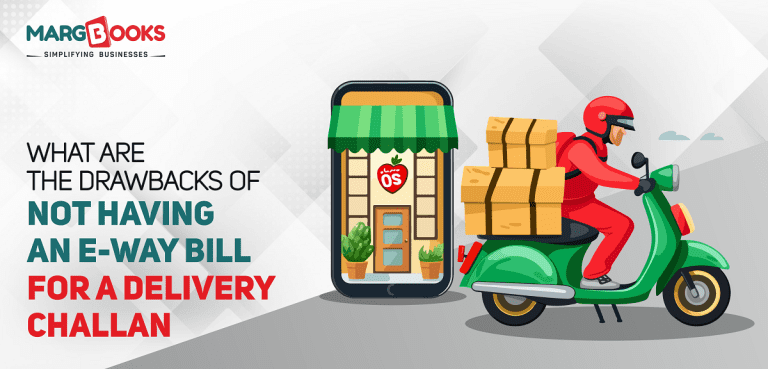The E-Way Bill for a Delivery Challan is an essential requirement for the seamless transportation of goods across states and within states in India. Introduced under the Goods and Services Tax (GST) framework, this digital document ensures that goods move legally and without unnecessary hindrances. However, many businesses, particularly small and medium enterprises (SMEs), often overlook its importance, leading to several complications. If you are running a business and deal with the transportation of goods, understanding the drawbacks of not having an E-Way Bill is crucial to avoid penalties, delays, and operational inefficiencies.
Understanding the E-Way Bill for a Delivery Challan
An E-Way Bill is an electronic document generated on the GST portal when goods worth more than Rs. 50,000 are transported. It contains details such as the consignor, consignee, transporter, and the nature of the goods. Businesses using Billing Software and Accounting Software, such as MargBooks, can easily generate E-Way Bills and ensure compliance.
A Delivery Challan is a document issued when goods are transported for reasons other than sales, such as job work, returnable goods, or inter-branch transfers. If the value of goods in transit exceeds the prescribed limit, an E-Way Bill becomes mandatory, even if a Delivery Challan is issued.
Major Drawbacks of Not Having an E-Way Bill for a Delivery Challan
1. Legal Penalties and Fines
One of the biggest risks of not generating an E-Way Bill for a Delivery Challan is the imposition of penalties. The GST authorities have strict provisions for non-compliance:
- A penalty of Rs. 10,000 or the tax amount (whichever is higher) can be levied for transporting goods without an E-Way Bill.
- The goods may be seized or detained until the penalty is paid.
- Additional fines may be imposed if authorities suspect tax evasion.
Such penalties can lead to unnecessary financial burdens on businesses, especially SMEs that operate on thin margins.
2. Delays in Transportation and Delivery
Without an E-Way Bill, transport authorities can stop goods in transit for verification. This can lead to unwanted delays, affecting:
- Customer commitments and delivery timelines
- Production processes in case of inter-branch transfers
- Vendor relations and supply chain efficiency
For instance, if a manufacturing unit relies on timely delivery of raw materials and those materials get delayed due to the absence of an E-Way Bill, it could disrupt the entire production schedule.
3. Seizure of Goods and Vehicle
Tax authorities have the right to seize or detain goods being transported without an E-Way Bill. In such cases:
- The business must pay a fine or penalty to release the goods.
- The transporter might also have to bear penalties.
- The vehicle used for transportation may be held, leading to additional logistics costs.
This not only affects cash flow but also tarnishes the company’s reputation with customers and suppliers.
4. Loss of Business Credibility
Regular instances of non-compliance can damage a company’s reputation. Customers and vendors prefer businesses that operate transparently and in accordance with legal requirements. If your goods are repeatedly delayed or seized due to the absence of an E-Way Bill, it might:
- Affect customer trust and satisfaction
- Lead to the loss of valuable clients
- Create friction with transporters and vendors
Businesses using Accounting Software like MargBooks can streamline compliance by automating the E-Way Bill generation process, reducing the chances of such errors.
5. Increased Compliance Burden Later
If a business fails to generate an E-Way Bill, it may face unnecessary compliance issues later, including:
- GST audits and scrutiny – Authorities may investigate your records, leading to added paperwork and stress.
- Reconciliation challenges – Matching invoices and delivery challans becomes cumbersome.
- Unnecessary disputes – Suppliers or customers might question missing documentation, affecting business relationships.
6. Impact on GST Return Filing
Since E-Way Bills are linked to GST filings, failure to generate them properly can create discrepancies in tax returns. This might:
- Attract scrutiny from the GST department
- Lead to incorrect Input Tax Credit (ITC) claims
- Result in penalties for mismatched invoices
How to Avoid These Issues?
The best way to avoid these complications is by ensuring strict compliance with GST rules regarding E-Way Bills. Here are some simple steps businesses can take:
- Use Reliable Billing and Accounting Software
- Implement Billing Software like MargBooks, which integrates E-Way Bill generation seamlessly.
- Automate compliance to reduce manual errors.
- Educate Your Logistics and Finance Teams
- Ensure that your team understands when and how to generate E-Way Bills.
- Conduct regular training sessions to keep them updated on GST compliance.
- Monitor Transactions and Documentation
- Keep track of all delivery challans and invoices.
- Cross-check GST reports with E-Way Bills to avoid discrepancies.
- Generate E-Way Bills in Advance
- Don’t wait until the last moment. Create E-Way Bills before the goods leave the warehouse to prevent delays.
Conclusion
Ignoring the requirement of an E-Way Bill for a Delivery Challan can result in significant legal, financial, and operational challenges for businesses. Delays, penalties, and reputational damage can severely impact business efficiency and profitability. By leveraging advanced Billing Software and Accounting Software, like MargBooks, businesses can ensure timely compliance, reduce errors, and maintain smooth logistics operations.
In today’s fast-paced business environment, staying compliant is not just about avoiding penalties—it’s about ensuring seamless operations, maintaining credibility, and building a trustworthy brand. So, make sure you always generate an E-Way Bill where required and keep your business running smoothly!




